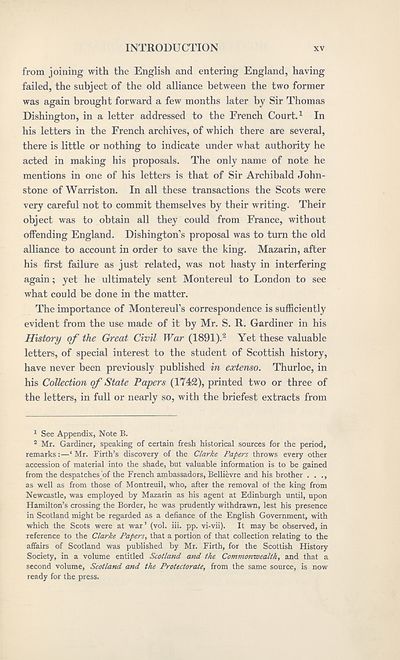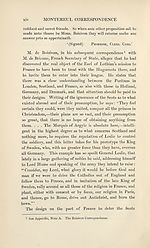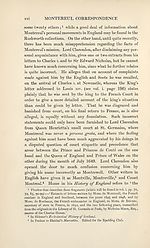Series 1 > Diplomatic correspondence of Jean de Montereul and the brothers de Bellièvre, French ambassadors in England and Scotland, 1645-48 > Volume 1
(20) Page xv
Download files
Complete book:
Individual page:
Thumbnail gallery: Grid view | List view

INTRODUCTION
xv
from joining with the English and entering England, having
failed, the subject of the old alliance between the two former
was again brought forward a few months later by Sir Thomas
Dishington, in a letter addressed to the French Court.1 In
his letters in the French archives, of which there are several,
there is little or nothing to indicate under what authority he
acted in making his proposals. The only name of note he
mentions in one of his letters is that of Sir Archibald John¬
stone of Warriston. In all these transactions the Scots were
very careful not to commit themselves by their writing. Their
object was to obtain all they could from France, without
offending England. Dishington’s proposal was to turn the old
alliance to account in order to save the king. Mazarin, after
his first failure as just related, was not hasty in interfering
again; yet he ultimately sent Montereul to London to see
what could be done in the matter.
The importance of Montereul’s correspondence is sufficiently
evident from the use made of it by Mr. S. R. Gardiner in his
History of the Great Civil War (1891).2 Yet these valuable
letters, of special interest to the student of Scottish history,
have never been previously published in extenso. Thurloe, in
his Collection of State Papers (1742), printed two or three of
the letters, in full or nearly so, with the briefest extracts from
1 See Appendix, Note B.
2 Mr. Gardiner, speaking of certain fresh historical sources for the period,
remarks:—‘ Mr. Firth’s discovery of the Clarke Papers throws every other
accession of material into the shade, but valuable information is to be gained
from the despatches of the French ambassadors, Bellievre and his brother . . .,
as well as from those of Montreuil, who, after the removal of the king from
Newcastle, was employed by Mazarin as his agent at Edinburgh until, upon
Hamilton’s crossing the Border, he was prudently withdrawn, lest his presence
in Scotland might be regarded as a defiance of the English Government, with
which the Scots were at war ’ (vol. iii. pp. vi-vii). It may be observed, in
reference to the Clarke Papers, that a portion of that collection relating to the
affairs of Scotland was published by Mr. Firth, for the Scottish History
Society, in a volume entitled Scotland and the Commonwealth, and that a
second volume, Scotland and the Protectorate, from the same source, is now
ready for the press.
xv
from joining with the English and entering England, having
failed, the subject of the old alliance between the two former
was again brought forward a few months later by Sir Thomas
Dishington, in a letter addressed to the French Court.1 In
his letters in the French archives, of which there are several,
there is little or nothing to indicate under what authority he
acted in making his proposals. The only name of note he
mentions in one of his letters is that of Sir Archibald John¬
stone of Warriston. In all these transactions the Scots were
very careful not to commit themselves by their writing. Their
object was to obtain all they could from France, without
offending England. Dishington’s proposal was to turn the old
alliance to account in order to save the king. Mazarin, after
his first failure as just related, was not hasty in interfering
again; yet he ultimately sent Montereul to London to see
what could be done in the matter.
The importance of Montereul’s correspondence is sufficiently
evident from the use made of it by Mr. S. R. Gardiner in his
History of the Great Civil War (1891).2 Yet these valuable
letters, of special interest to the student of Scottish history,
have never been previously published in extenso. Thurloe, in
his Collection of State Papers (1742), printed two or three of
the letters, in full or nearly so, with the briefest extracts from
1 See Appendix, Note B.
2 Mr. Gardiner, speaking of certain fresh historical sources for the period,
remarks:—‘ Mr. Firth’s discovery of the Clarke Papers throws every other
accession of material into the shade, but valuable information is to be gained
from the despatches of the French ambassadors, Bellievre and his brother . . .,
as well as from those of Montreuil, who, after the removal of the king from
Newcastle, was employed by Mazarin as his agent at Edinburgh until, upon
Hamilton’s crossing the Border, he was prudently withdrawn, lest his presence
in Scotland might be regarded as a defiance of the English Government, with
which the Scots were at war ’ (vol. iii. pp. vi-vii). It may be observed, in
reference to the Clarke Papers, that a portion of that collection relating to the
affairs of Scotland was published by Mr. Firth, for the Scottish History
Society, in a volume entitled Scotland and the Commonwealth, and that a
second volume, Scotland and the Protectorate, from the same source, is now
ready for the press.
Set display mode to:
![]() Universal Viewer |
Universal Viewer | ![]() Mirador |
Large image | Transcription
Mirador |
Large image | Transcription
Images and transcriptions on this page, including medium image downloads, may be used under the Creative Commons Attribution 4.0 International Licence unless otherwise stated. ![]()
| Permanent URL | https://digital.nls.uk/127021689 |
|---|
| Shelfmark | SCS.SHS.29 |
|---|---|
| Attribution and copyright: |
|
| Attribution and copyright: |
|
|---|
| Description | Over 180 volumes, published by the Scottish History Society, containing original sources on Scotland's history and people. With a wide range of subjects, the books collectively cover all periods from the 12th to 20th centuries, and reflect changing trends in Scottish history. Sources are accompanied by scholarly interpretation, references and bibliographies. Volumes are usually published annually, and more digitised volumes will be added as they become available. |
|---|


